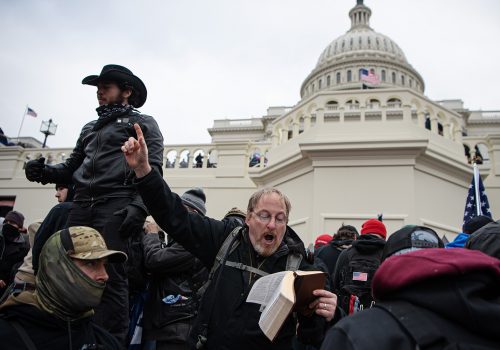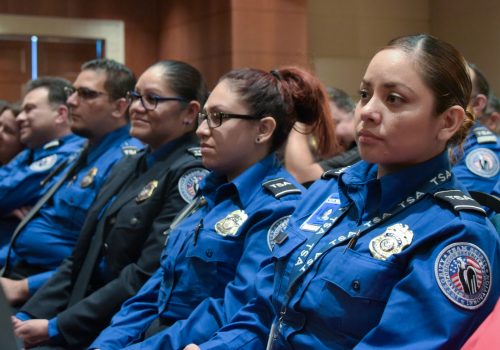Event Recap: After the Insurrection: Domestic Violent Extremism and the Intelligence Challenge
On May 25, the Scowcroft Center for Strategy and Security and its Foward Defense practice area’s Future of DHS Project in partnership with the Digital Forensic Research Lab (DFRLab) and the Scowcroft Middle East Security Initiative hosted an event examining domestic violent extremism and the failures in intelligence analysis and warnings that allowed the storming of the Capitol building on January 6. The panel included: Tom Warrick, Nonresident Senior Fellow and Director of the Future of DHS project, Atlantic Council; Patricia Cogswell, Strategic Advisor, National Security Sector at Guidehouse; Todd Rosenblum, Nonresident Senior Fellow, Atlantic Council; Mitch Silber, Executive Director at Community Security Initiative; Caryn Wagner, Adjunct Faculty Member, National Intelligence University. Dina Temple-Raston, correspondent, investigations at National Public Radio (NPR) moderated the event.
Key takeaways from the event
The attack on the US Capitol on January 6 has raised questions on whether the United States should change the way it views domestic terrorism under the scope of national security. Mitch Silber indicated that the US is closing the door on the post-9/11 extremists threats, as the new era of counterterrorism will focus on domestic terrorists. Throughout this event, it was highlighted that, although there was data collected by the intelligence community prior to the attack, the issue stemmed from the analysis and failure of the government to properly warn public officials. Those who were warned were not given a sufficient amount of time to properly prepare for the January 6th riots. The four panelists who were asked about their position on a bipartisan or nonpartisan commission agreed that a comprehensive commission covering the January 6th attacks is essential.
What went wrong?
Silber highlighted that the intelligence community has three main components: collection of data, analysis of data, and providing warnings when data is collected. The three questions that Silber believes must be addressed when analyzing January 6th are: why was there an intelligence failure? Why was the government surprised? What can be fixed so an incident like this does not occur again? Government departments failed to inform government officials, therefore, the attack on the US Capitol was not due to a lack of intelligence. Instead, it was the inability of those in power in the US government to act on the data collected. Todd Rosenblum insisted that this failure stems from an intimated US intelligence community that originated from a Trump administration that fostered this issue. Furthermore, Rosenblum elaborated on how the at-the-time intimidated intelligence community was a result of failed leadership, stating that January 6th was not solely an intelligence community failure—it was a government-wide miscarriage.
Roadblocks to enacting more sufficient domestic terrorism prevention
The shift in foreign terrorist groups to domestic terrorism has presented challenges to US counterterrorism. Specifically, international terrorist groups are known to have large chains of command and networking systems. The current domestic terrorism threat the US faces is facilitated by small groups and individuals who rely on social media. Therefore, the monitoring of US citizens, in comparison to foreign nationals abroad, results in possible constitutional impediments. Furthermore, Rosenblum believes that this issue has been politicized, as those with certain political beliefs would call some “treasonous” for reporting a January 6th rioter.
Policy recommendations from the event
The panelists had ranging recommendations that focused on a similar theme: enhancing social media monitoring and warning systems. The idea of creating robust social media and domestic terrorist analysis units forefronted Silber’s recommendations. Silber highlighted the importance of these analytical units being placed in a neutral area between the DHS and FBI to prevent critical information from getting stuck or lost in circulation. Caryn Wagner agreed with the recommendation for an upgrade to social media monitoring; however, she emphasized that there must be transparency and oversight in this process.
Furthermore, one of the failures in preventing the January 6th attacks stemmed from the inability to effectively warn the public. Therefore, Silber recommended that a new position, such as a Deputy Director of National Intelligence, should be created solely to focus on warning the government on domestic threats. As other panelists agreed, without an established warning mechanism, the proper agencies and law enforcement groups cannot sufficiently prepare and respond to domestic terrorist attacks.
From the intelligence community perspective, Patricia Cogswell recommended that both the collectors and receivers of information from the intelligence community be further prepared on how to handle domestic threats moving forward. From an external perspective, Rosenblum indicated that there must be competent leadership and broad accountability across the government.
Hezha Barzani is an intern with Middle East Programs.
Image: National Guard soldiers stand guard behind a security fence near the U.S. Capitol after police warned that a militia group might try to attack the Capitol complex in Washington, U.S. March 4, 2021. REUTERS/Jim Urquhart/File Photo


